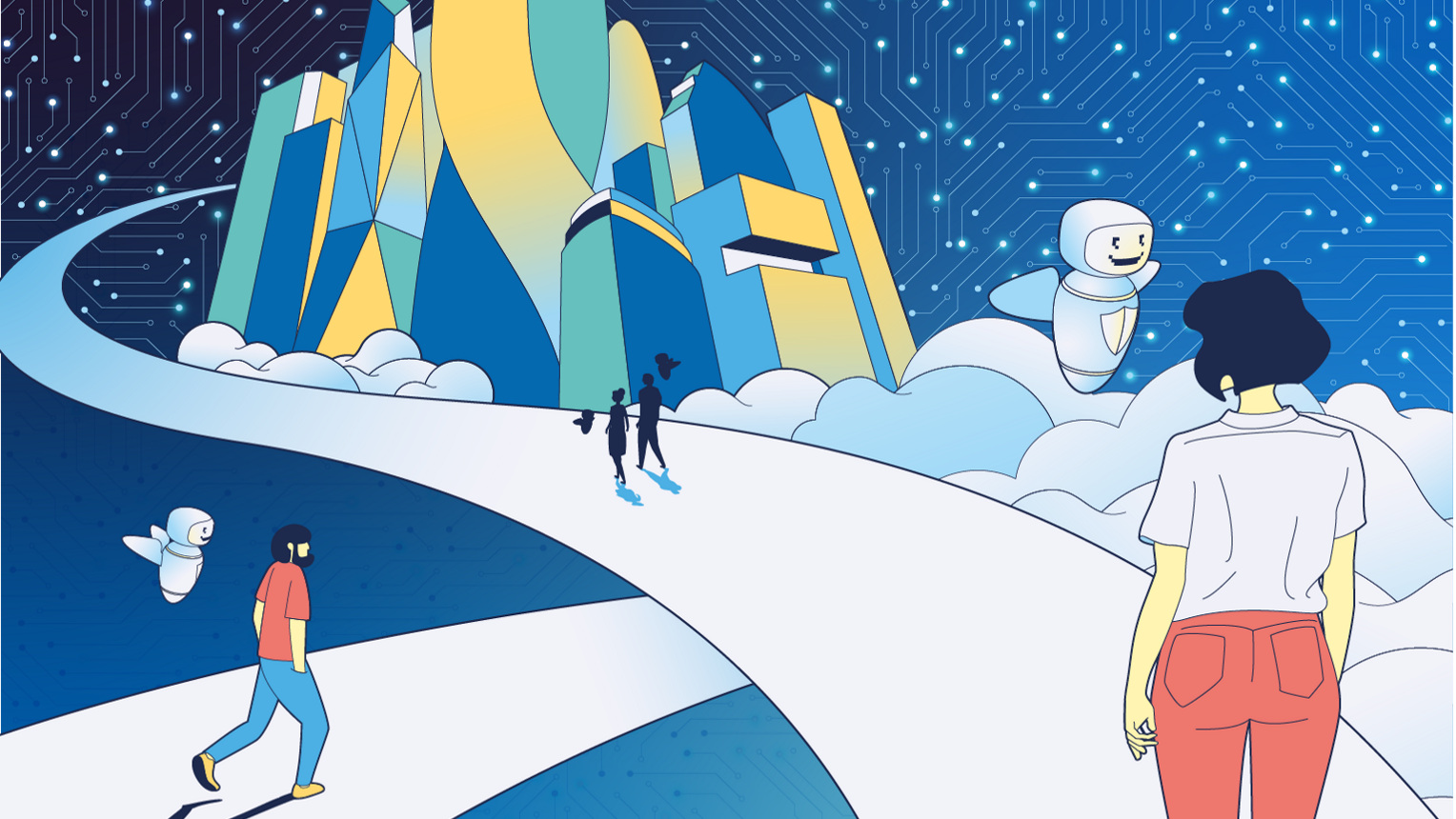My wife is a physician, so we often find ourselves in social engagements with other physicians. When asked what I do, many are intrigued by what it means to be a computer science professor.
Do you program computers? Not for quite some time. My graduate students do that now.
Do you teach people how to program? No, though some of my colleagues do.
Do you do ‘AI’? Yes, I work in that area, building mathematical models to improve decision making, particularly when there is data, risk, and uncertainty.
Communicating the rich life of working in the broad field of computer science is critical for our ongoing well-being. Computer science is far more than programming and hardware. It is a way of looking at and solving problems. This means that having several “elevator speeches” ready is critical to tell our story.
An elevator speech is a 30-second, nontechnical spiel of what you do. Most noncomputer science people are not interested in the finer details of compilers, programming languages, databases, and algorithms. What they want to know about is something that they are familiar with and touches their lives.
Elevator speeches are about communication and a vehicle to grow our footprint of stakeholders. We are all highly adept at communicating amongst ourselves. Even with those in different areas of computer science, our knowledge base is sufficiently wide to appreciate our colleagues’ interests. We effortlessly espouse the wonderful virtues and advances in our field with each other.
But what about the educated, non-computer science person? Can we help them to appreciate our work? What about a person without a college degree? Is expanding the diversity of our audience necessary? Indeed it is.
The terms “artificial intelligence” and “machine learning” are regularly mentioned in reports from the government, the military, industry, and medicine, even when they are not fully understood. A captive audience exists for our field to engage with.
Engaging Our Captive Audience
Demand for computer science skills and knowledge is soaring. Many computer science departments are launching online master’s programs to fill this need. The pace of hiring faculty and instructors is near frenetic. This is the best of times for our field. Yet good times do not last forever.
The late 1990s dot.com bubble that burst marked the beginning of an extended period when computer science bachelor’s degree enrollment waned.4 Will the current list of layoffs at high-tech firms be the beginning of a similar fall off?
No crystal ball exists that can peer into the future with great accuracy. What remains clear is that widening the footprint of support that our field builds today when times are good will serve us well when the tailwinds shift to headwinds. Building more and stronger bridges with the public can only strengthen our field, which is why public engagement is on the list of Broader Impact activities described by the National Science Foundation.3
So how do we do that?
Public engagement is not just about getting a place at the table in society. It is about anchoring ourselves there so that no tsunami can blow us away. And the time to do this is now when there is no obvious urgency.
The Many Flavors of Public Engagement
Public engagement comes in many flavors. It may involve speaking with journalists, reporters, and congressional staff so that our ideas and insights on issues of national interest get reported and heard. It may be giving radio and television interviews that provide avenues to demonstrate the wide benefits of our field that impact society. It may involve writing essays and opinion articles that showcase how our expertise can address current events.
The breadth of societal issues about which computer scientists can provide expert commentary and evaluation is almost unlimited. What it requires is standing back from our day-to-day activities and thinking more broadly of how our knowledge and expertise can shed light on societal issues that demand sensible “computer science” thinking and insights.
Consider the COVID-19 pandemic, which generated large amounts of data that required appropriate analysis and interpretation. Epidemiologists were at the forefront of such efforts, and rightly so. Yet, we as a community have a plethora of expertise that can provide insights to contribute to this dialogue and inform the public on complex issues beyond the traditional methods employed by epidemiologists. For example, opportunities abounded to collaborate with domain experts and bring data visualization to the broader public audience and showcase our talents for the public good (91-DIVOC, a website that visualized COVID-19 data, provided one such example).
Computer science is far more than programming and hardware. It is a way of looking at and solving problems.
Numerous other societal issues can benefit from our expertise and contribute to the national dialogue. Examples include reducing gun violence, reducing the influence of gerrymandering, and improving access to healthcare. All such areas are flush with data, which can be analyzed, interpreted, or visualized in a manner that would benefit public understanding and perceptions.
Public engagement also provides visibility for our field and universities, which can enhance student recruitment, particularly undergraduates. It also helps to attract a more diverse student body, as communications reach across a wide swath of the population.
There is a dark side to public engagement. Some may fear the worst, such as being misquoted or misrepresented. Quotes may be taken out of context to transform a thoughtful comment into a tool to support someone’s agenda. Social media attacks may occur, given the ease at which such postings can be made. These are possible risks anytime we enter the public dialogue, demanding restraint and pause when human instinct pushes us to respond otherwise.
Yet there are also risks associated with doing nothing. Letting others tell a story that we are most qualified and positioned to articulate may lead to misrepresentation and the misinformation it may contain.
Action Items
Many in our community are not comfortable with such interactions. It clearly demands a certain type of personality to be interviewed on radio or television. However, the skills that make one an effective classroom instructor or research paper author can be adapted when giving interviews or writing opinion essays.
Universities, government agencies, and industry organizations all have news bureaus or public relations offices that can facilitate public engagement. They often provide avenues for media training, a must for anyone interested in participating.
Every computer science department or research unit in government or industry labs would be well served to identify a group of people who are available and willing to satisfy this communication need. For example, when issues arise that can benefit from a computer science perspective, these individuals may offer to write and publish an opinion essay on the topic. Such bottom-up efforts serve to elevate the profession, further ingraining our field amongst a diverse footprint of potentially untapped stakeholders.
Formulae for Success
The key to being successful in this domain is building relationships. Reporters and journalists need our expertise and insights to enhance the credibility and veracity of their stories. They also work on rapid-fire tight timelines, which means they constantly reach out to multiple people simultaneously, so timely response is critical.
Opinion essays published in media outlets are vetted by editors, with each outlet falling within well-defined hierarchies. For traditional media, The New York Times, Washington Post, and The Wall Street Journal are high-visibility outlets. Other national papers that have significant influence include The Los Angeles Times, Chicago Tribune, USA Today, and The Hill (Washington). High- impact regional papers include the Boston Globe, New York Post, Atlanta Journal Constitution, Dallas Morning News, and San Francisco Chronicle. The Conversation provides a model for academics to engage with the public through well-researched essays. Space in all these outlets is competitive and limited, so getting accepted there is much like getting accepted at major conferences in our field.
If you provide timely and insightful comments to a journalist, they will return for more. If your essays generate widespread commentary (social media engagements is one measure), editors take note and welcome other pieces from you.
Public engagement comes in many flavors.
What makes computer scientists so valuable is our knowledge base, our analytical thinking, and how we can provide insights into a plethora of societal issues. By communicating this knowledge and contributing our insights for the public’s benefit, we are planting seeds in society that may bear fruit many years into the future, possibly when our field is going through leaner times, which at some point will occur.
The Future
Telling our story is not just a good thing to do. It is a necessary thing. It lays a foundation for our field outside academia and research labs, including with politicians who provide funding (for those in state schools), and amongst the public, whose perception of academia and research informs our value proposition in society. Given that there is a growing wave of public skepticism about computer science, including the ethics surrounding artificial intelligence and its impact on the work force, public engagement is one avenue to mitigate such concerns.
ACM maintains a Media Center and reports “In the News” from its members and the field. They also disseminate podcasts and “Hot Topic” webinars as vehicles for communication. The most effective communications must percolate up from its members. ACM can amplify such communications, but it is the members who must seed such voices.
The Computing Research Association (CRA) has offered programs for graduate students to enhance their oral communication skills.2 The CRA Government Affairs group supports the computer science field, serving as an advocate on Capitol Hill and working to develop future leaders. All such efforts provide a rich set of opportunities for computer scientists to partake in public engagement activities.
The American Association for the Advancement of Science (AAAS) runs workshops on science communication.1 These three-hour events provide an introductory bootcamp for science communication. Such events are invaluable to appreciate the basics of science communication.
Unlike physics, which has found a place in society that enamors the public and has gained public support, computer science has not attained such eminence and stature. Is this a reasonable and appropriate objective to strive for? If “The Big Bang Theory” can be a popular television program showcasing physicists, can “The Big ‘O’ Theory” be far behind for computer scientists?
What makes computer science unique is how ubiquitous computers and computing have become. Whether it is smartphones or the Internet of Things (IoT) that influence everyday life, computer science is at the fulcrum of all such devices and systems. This positions those in our field as essential societal spokespeople and communicators.
Though it is difficult to envision the popularity of computer science waning anytime soon, an ever-changing world guarantees that “black swans” occur at the most unlikely times.
The best time to secure our field is when there appears little need to do so. That time is now. Being a computer science communicator is vital to support such activities.



Join the Discussion (0)
Become a Member or Sign In to Post a Comment